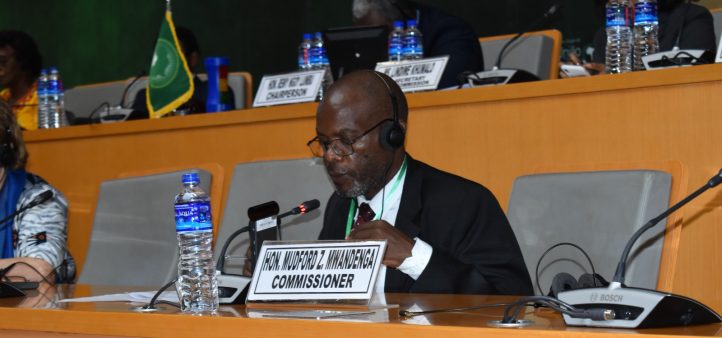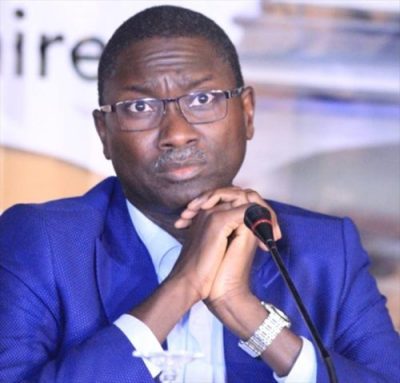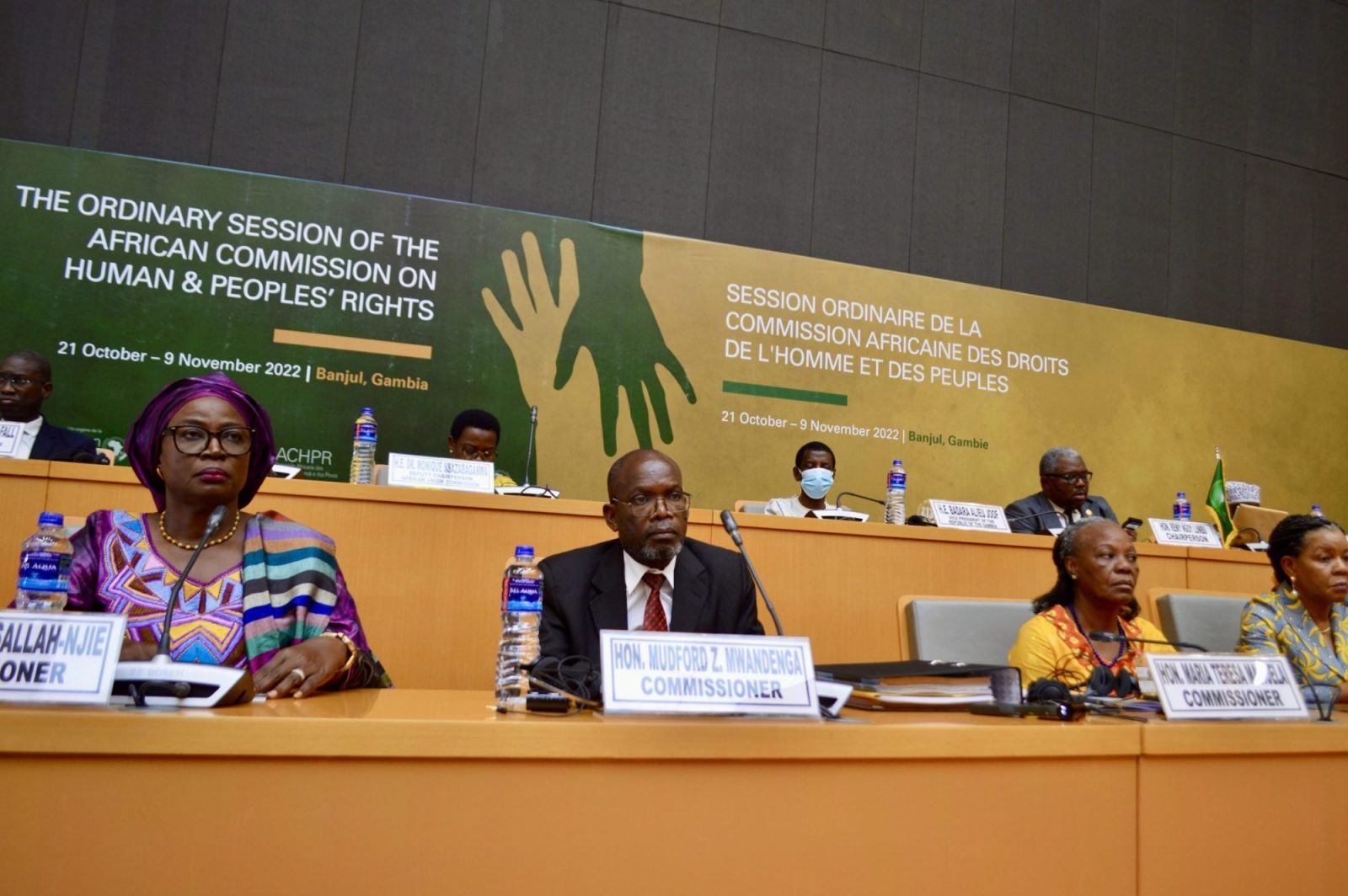The session ceremony was opened by the speech of the Vice President of the Republic of The Gambia, H.E. Dr. Isatou Touray. Following her statement, the outgoing Chairperson of the African Commission, Honourable Commissioner Soyata Maiga, noted the relevant situations in the continent to be addressed, notably the pervasive instances of terrorism occurring in the Sahel, the deplorable acts of xenophobia perpetrated against foreigners residing in South Africa, disturbing violations against children, violations committed by multinational corporations, repression of demonstrations, harmful practices and discrimination against women, and the impact of extractive industries on indigenous communities.
Later on, the Commissioners presented the results of the election of the new African Commission’s Bureau for a two-year term. The Bureau is now composed of Hon. Commissioner Solomon Ayele Dersso as the Chairperson and Hon. Commissioner Rémy Ngoy Lumbu as the Vice Chairperson. They presided over the deliberations during the 65th Ordinary Session.
A total of 599 delegates took part in the session, which is 244 more participants than the last session held in Sharm el-Sheikh, Arab Republic of Egypt. This includes 31 of the 53 States parties to the Charter, representing a participation rate of about 60.78%.
On this occasion, the human rights situation of two countries was reviewed: the Republic of Chad’s 2nd periodic report covering the period 1998-2015 and the Republic of Zimbabwe’s 11th to 15th combined periodic reports, for the 2007-2019 period. Prior to this review, ISHR, along with the Ligue Tchadienne des Droits de l’Homme (LTDH), submitted a briefing paper on the situation of human rights defenders in Chad. During the review, States presented their report in length and answered questions asked by the Commission, including Special Procedures. In addition, some NGOs had raised certain issues in their statement delivered through Item 4 (human rights situation in Africa).
During this session, the Commission welcomed numerous progress made at the national level towards a better implementation of the rights guaranteed in the African Charter on Human and Peoples’ Rights. Indeed, it welcomed the release of political prisoners in Cameroon, the Children Protection and Welfare Act adopted in Côte d’Ivoire, efforts at enhancing the participation of women in public life including the increase in the representation of women in parliament in Malawi, the progressive decisions of the Courts of Kenya and Tanzania on health services for reducing maternal morbidity and upholding the minimum age for marriage at 18 years and the review of the Marriage Act and Customary Marriages Act of Zimbabwe.
Nevertheless, some statements and the activity reports of the members of the African Commission made observations on the excessive force used by the police during mass demonstrations in Guinea, Malawi, Sudan and Uganda; the reduction of civic space or even the high number of arbitrary arrests and detention of defenders. Civil society organisations also highlighted the implementation of the Cybercrimes Act in Nigeria, with journalists particularly being prosecuted, the blanket ban on protests in August and abductions in Zimbabwe as well as the reprisals and intimidations faced by defenders who attempt or collaborate with regional and international mechanisms. These accusations contrasted with the positive balance that the governments were trying to draw.
The African Commission raised concerns about the human rights violations and abuses caused by the conflicts and political crisis in Cameroon, South Sudan, Central African Republic, the Democratic Republic of Congo, and the recent violence in Ethiopia. Concerns were also highlighted regarding the spreading of terrorist attacks in Burkina Faso, Mali and Nigeria, internet shut down in Zimbabwe, Chad, Cameroon, and Ethiopia. All these situations reduce civic space and create a chaotic environment for the work and safety of human rights defenders.
In spite of all these alarming situations, it was recognised that the African Commission made noticeable accomplishments in line with the provisions included in the African Charter, the founding legal instrument of the African human rights system.
As her mandate as Commissioner and Chair of the African Commission comes to an end, the Commission took the time to congratulate Hon. Commissioner Soyata Maiga for her outstanding work during the past 12 years. This includes the adoption of 12 documents interpreting various rights in the African Charter such as General Comment No. 2 on Article 14 of the Protocol to the African Charter on Human and Peoples’ Rights on the Rights of Women in Africa and the Guidelines on Freedom of Association and Assembly in Africa.
In addition, Commissioner Rémy Ngoy Lumbu, Special Rapporteur on human rights defenders and focal point on reprisals in Africa, launched on 23 October 2019 his new policy and information note on reprisals in Africa during the panel on the protection of human rights defenders. He used this opportunity to call on all defenders and organisations of human rights defenders to submit cases of reprisals they have been victims of for their engagement with the Commission. Ahead of that, on 22 October, the Special Rapporteur also presented the document more in depth during a side event organised by ISHR and DefendDefenders.
The Working Group on Extractive Industries, Environment and Human Rights (WGEI) also held a panel on their background study on the operations of the extractive industries sector in Africa and its impacts on the realisation of human and peoples’ rights under the African Charter on Human and Peoples’ Rights. They also used this opportunity to launch the second WGEI Newsletter. The draft study report in question considers the main challenges resulting from extractive industries in Africa, the underlying causes of human rights violations in this sector, the human rights framework provided by the African Charter and other regional and international instruments, as well as the gaps in the protection of human rights in relation to the activities of extractive industries.
To conclude, during the 65th session the African Commission adopted 9 resolutions:
- Resolution 425 on the renewal of the mandates of the Special Mechanisms of the African Commission on Human and Peoples’ Rights (ACHPR / Res. 425 (LXV) 2019;
- Resolution 426 on the appointment of Expert Members of the Committee for the Prevention of Torture in Africa CADHP / Res.426 (LXV) 2019;
- Resolution 427 on the use of the expertise of former commissioners to amplify the work of the African Commission on Human and Peoples’ Rights ACHPR / Res.427 (LXV) 2019;
- Resolution 428 on the Situation of human rights in the Republic of the Sudan CADHP / Res.428 (LXV) 2019;
- Resolution 429 on the Situation of human rights in the Federal Democratic Republic of Ethiopia ACHPR / Res.429 (LXV) 2019;
- Resolution 430 on the recognition, promotion and protection of indigenous languages CADHP / Rés.430 (LXV) 2019;
- Resolution 433 on the Elections in Africa (ACHPR / Res. 433 (LXV) 2019);
- Resolution 432 on the preparation of an African Declaration on the promotion of the role of human rights defenders and their protection in Africa CADHP / Res.432 (LXV) 2019; and
- Resolution 431 on the right to food and nutrition in Africa ACHPR / Res.431 (LXV) 2019.




